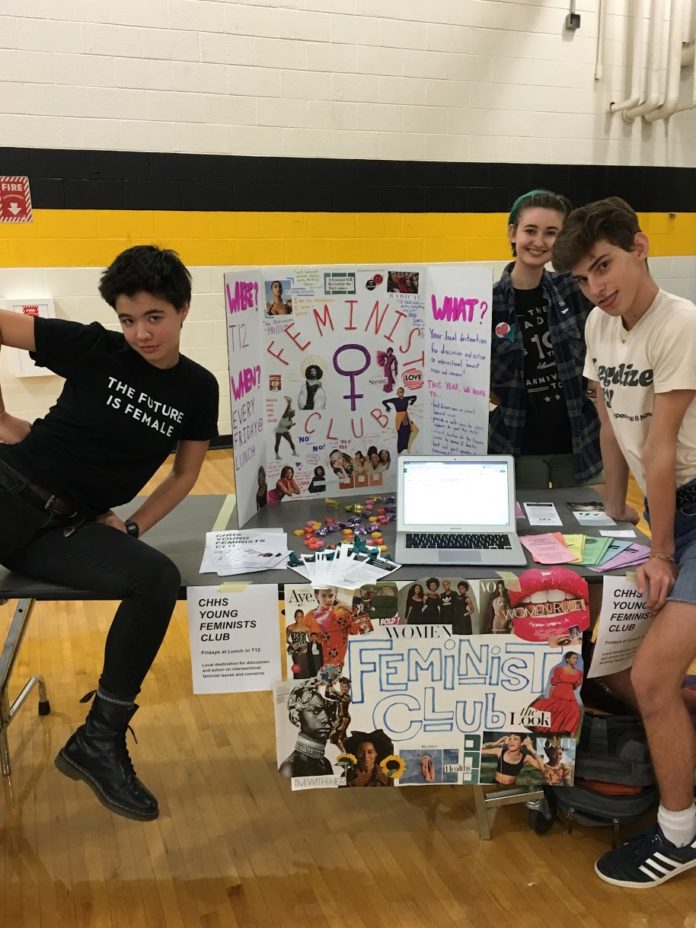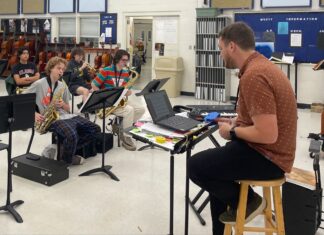
Chapel Hill High School’s Young Feminist Club (YFC) is back in full swing for the 2017- 2018 school year with a new teacher sponsor and new student leadership. The club is deter- mined to turn its conversation- based meetings of last year into organization and action in the wider community, under the new leadership of junior Tallulah Chen.
“We had mainly conversation-based meetings last year,” Chen said, focusing on “de ning feminist-based issues in the community and becoming familiar with feminist vocabulary.” At this year’s rst meeting, the leader- ship started with an introduction to feminist history, vocabulary and modern movements such as intersectionality.
The leadership in the club last year was completely white, which made discussions of race-based issues within feminism much more rare. When race issues were brought to the table, the leader- ship would “turn to the only two people of color in the club,” said Chen—one of those two students. “It was a weird moment of tokenization,” she said.
Intersectionality, as Chen de ned it, is “feminism that is inclusive of all gender identities, sexual orientations, races, religions and economic or social classes.” To further the spread of intersectional feminism at Chapel Hill High School, YFC is encouraging students to realize the privilege they have just by living in Chapel Hill. “The fact that we can use these words and organize around a club like this is such a privilege,” Chen said.
Junior Sergio Jimenez says that the club’s mission is to pro- vide a safe space for Chapel Hill students and “get the younger generation to care” as well as edu- cate them on the issue. “The club really changed the way I viewed the world. At the start of my fresh- man year, I wasn’t even aware of what sexism was,” Jimenez said.
Especially in a political cli- mate as polarized as the current one, there is often a stigma surrounding feminism. Chen believes that the solution to removing this negative stigma is to “talk about [feminism] in a way that is not intimidating, but rather personal.” In a socially liberal environment such as Chapel Hill, it is easy to forget that the word “feminism” can have negative con- notations, so students in the club encourage one another to focus on the realities by “telling those stories of sexual harassment and look at women in science.”
Jimenez has not, and most likely will not, assume a leader- ship position because he identi- es as male and creating space for minority voices to tell their own stories is a priority for the club. “We de nitely wanted a fe- male teacher,” Jimenez said. “We were looking for an adult ally and a connection to the administration more than anything.”
Last year’s teacher sponsor, David Bennett left his position at Chapel Hill halfway through the school year, leaving the group without a meeting place. In prepa- ration for this school year, Chen reached out to Anne Beichner, who took over as faculty advisor. Beichner says her ideal role in the club is to be a “small guiding hand” and to “provide a home,” but she acknowledges that YFC is “really well self-directed.”
Beichner hopes to see contin- ued exibility from the members of the YFC as they travel through high school and beyond. “It is very easy to get locked into a value system that you feel is very progressive, but then fail to keep up. What is progressive now may not be in 20 years.”
Some key ideas put into action by the YFC last year include the Compass Center Drive, an election night watch party, carpooling to local protests and marches and working with the local organization Youth Against Rape Culture on initiatives such as “CHHS Loves Consent.” The club also had multiple guest speakers including Alexis Gumms a black feminist theorist and writer at Duke University—and Chapel Hill alumni now in college who came back to talk about navigating feminism in college.











